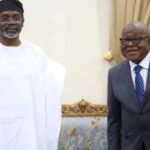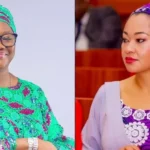The Nigerian Government has announced that the nationwide curfew put in place to curb the effects of the deadly coronavirus is now from 12am to 4am.

The National co-ordinator of the Presidential Taskforce on COVID-19 Dr Sani Aliyu, made the announcement in Abuja during a press briefing.
He said:
I will first of all start with general movement.
We are modifying the curfew to commence from 12 midnight to 4am nationwide. Effective immediately.
This does not apply to people on essential services and international travellers that might be returning from abroad.
READ: President Buhari Approves November 1st As National Youth Day In Nigeria
Meanwhile, President Muhammadu Buhari has approved the fourth phase of the COVID19 protocol based on the Presidential Task Force recommendations and also extended the tenure of the PTF till the end of December 2020.
Buhari also approved the seizure of passport or denial of Visa to travelers who breaches the 14 days quarantine protocols
Below is the full address of the Chairman of the PTF Boss Mustapha held today at the International wing of Murtala Mohammed International Airport Lagos.
REMARKS BY THE SECRETARY TO THE GOVERNMENT OF THE FEDERATION/CHAIRMAN OF THE PTF-COVID-19 AT THE NATIONAL PRESS BRIEFING OF THURSDAY, 3rd SEPTEMBER, 2020
I welcome you all to the National Briefing by the Presidential Task Force (PTF) on COVID-19 for Thursday, 3rd September, 2020. We are holding this briefing at the International wing of the Nnamdi Azikiwe International Airport ahead of the reopening of the airspace for international flights.
2. Following the approval of recommendations contained in the 6th Interim Report by Mr. President, the PTF on Thursday 6th August announced a further extension of Phase Two of the eased lockdown, albeit with modifications on the restrictions.
3. One month down the line, we consistently briefed the nation about the changing situation around the world and the challenges nations and scientists have been facing. In cumulative terms, the virus continues to pose enormous threats to humanity and all known systems.
4. The global response has continued to witness huge deployment of resources and collaborative efforts to combat the pandemic. Notwithstanding all these, the following statistics depict the virulent nature of the virus:
The global confirmed cases have exceeded 25 million (25,917,000 as at 02/09/2020);
Since hitting the 15 million mark, numbers have been increasing by 1 million cases every 3-4 days;
The countries that top the global disease burden include: United States (6,257,9380, Brazil (3,952,790), India (3,769,523) and Russia (1,005,000);
South Africa still has the highest case count in Africa but has fallen from the fifth to the sixth position in the world;
In Ethiopia, the numbers have been on the increase;
Both South Africa and Ethiopia are of interest to Nigeria in view of the passenger traffic between Nigeria and the two countries and our plans to reopen the international air space;
Global challenges impacting the fight against the pandemic have been identified to include the following:
o General complacency setting-in among the populace;
o Non adherence to NPIs;
o Politicization of the pandemic; and
o Limited funding across many countries for the response needs.
5. By way of comparison, the changes in numbers between August and September are depicted in the tables below:
ALSO READ: Madagascar President Sacks Health Minister For Seeking Foreign Help To Fight Coronavirus
Change in Cases, August –September 2020
1st August 1st September Increase
Absolute Percentage
Global 18,216,962 25,892,051 7,675,089 42%
Africa 961,219 1,264,407 303,188 32%
Nigeria 43,537 54,247 10,710 25%
Change in Deaths
1st August 1st September Increase
Absolute percentage
Global 692,280 860,324 168,044 24%
Africa 20,346 30,103 9,757 48%
Nigeria 883 1,023 140 16%
7. The global community has made appreciable progress in the development of COVID-19 Vaccine. As at 28 August 2020, a total of 173 candidate vaccines were under evaluation. 33 candidate vaccines are under clinical evaluation (8 are in phase 3 trials) while 143 candidate vaccines are in pre-clinical evaluation. The PTF continues to monitor developments so that the country can benefit from the emergence of an effective vaccine.
8. The PTF has continued to assess developments in Nigeria preparatory to the determination of the next steps. As at September 2, 2020 the number of confirmed cases in Nigeria was 54,463, with 1,027 recorded deaths. Between August and September, the number of states with over 1000 confirmed cases increased from 10 to 12 and the FCT. The Case Fatality Ratio (CFR) has consistently remained at 1.9%, indicating improved case management and resulting in fewer COVID-19 deaths. Similarly, the cumulative Test Positivity Ratio (TPR), which shows how many percent of our total tests are positive, has reduced from 15.2% at the end of July to 13.3% at the end of August. The tables below illustrate the situation of the CFR and TPR:
READ: Lawyers Fault Nigerians Threatening To Sue Chinese Government For $200 Billion Over Coronavirus
10. The accomplishments recorded through the national response in the period under review include the following:
i. Nigeria now has 68 laboratories in the COVID-19 network, spread across 34 States and the FCT. The remaining two (Kebbi and Niger) States are in the pipeline for coverage in the next few weeks;
ii. PFT has strengthened collaboration with all the States in the country to maintain one national response to address the pandemic. This has been driven by joint work between the PTF and a sub-committee of the National Economic Council chaired by Governor Ifeanyi Okowa of Delta State;
iii. The number of cumulative samples tested has exceeded 400,000;
iv. Increased risk communication through collaboration with community leaders and partners;
v. Improved synergy and collaboration with the Legislature;
vi. Successful conclusion of the evacuation process of stranded Nigerians ahead of the resumption of international flights;
vii. Built stronger coordination with the private sector to mobilise resources for the response;
viii. Launched two dashboards to improve transparency about the response and deployment of resources;
ix. Generated increased partner support for the response at the State level;
x. Nigeria’s efforts in case management and contact tracing have continued to keep our death rate well below the global average. and
xi. New guidelines have been developed to support the safe reopening of other sectors of the economy. The National Coordinator will brief on the guidelines.
DON’T MISS: My V⍺gin⍺ Almost Caught Fire; Nigerian Lady Narrates Her Experience With China Made Vibrator
11. Notwithstanding the foregoing, our national response, like in other countries of the world, continue to face significant obstacles. These include:
i) Insufficient engagement by some states with the national response;
ii) Low number of sample collection sites and rate of sample collection; and
iii) Declining level of compliance with non-pharmaceutical prevention measures.
12. The PTF is particularly disturbed by the low level of sample collection because of what it portends for the strategy of testing, detection, tracing, isolation and treatment. For example, in July, 7 States reported lower number of samples collected than in the preceding month, but in August this number rose to 32 states. This illustrates that despite the increased diagnostic capacity, and improved access to testing, the demand remains low with not enough samples being collected. Therefore, the recent reduction in cases in some states could be attributed to low testing.
13. Nigerians will all recall that at the onset of the eased lock down, the PTF drafted a three-phase strategy of easing the restrictions, ahead of a full reopening of the society and economy. In determining what phase of the strategy to move to, the PTF tried to balance the public health and economic considerations alongside data analysis. The PTF believes that while Nigeria is not ready for a full re-opening of the economy, there has been sufficient progress to warrant significant further relaxation of the restrictions applied.
14. Based on the foregoing, the PTF today submitted its 7th Interim Report to Mr. President for his consideration and approval. The main thrust of the recommendation is that Nigeria advances to the third phase of eased restrictions with further amendments, to address economic, socio-political and health concerns. This will last till a time when the epidemic is sufficiently controlled in Nigeria.
15. Accordingly, Mr. President has considered and approved the following:
i. Transition into the third Phase of the National Response to COVID-19 for a period of four weeks with effect from 12.01 am on Friday 4th September, 2020 in line with amendments to address economic, socio-political and health considerations reflected in the implementation guidelines;
ii. Continued engagement with States and Local Governments to improve community sensitisation on the response;
iii. Maintaining the current non-pharmaceutical interventions nationwide;
READ: WAEC: 9 Final Year Students Writing WASSCE In Kwara, Gombe Tests Positive For Coronavirus
iv. Urging the State governments to work with Local Government authorities in their states to intensify necessary measures such as contact tracing, grassroots engagement and risk communication;
v. Strengthening the collaboration between the Federal and State organs to harmonise the country’s COVID-19 response, in the short, medium and long-term basis; and
vi. Introduction of sanctions including the suspension of passports or denial of foreign travels for violation of current provisional travel related quarantine protocols.
16. Mr. President has similarly considered the fact that the six-month mandate of the PTF will expire this month and has therefore extended it till the end of December, 2020. The objective is to:
(i) Sustain a robust multi-sectoral national response;
(ii) Ensure that we successfully navigate the community spread stage of the pandemic;
(iii) Strengthen our health system and other socio-economic infrastructure to enable them meet our national aspirations.
17. The National Coordinator will now provide the details of changes to the to the guidelines and protocols.
18. I thank you all for your kind attention.
More Coronavirus News:





![Sophia Egbueje Takes Delivery Of Her Lamborghini, Throws Shade At Burna Boy [Video] 7 Sophia Egbueje Takes Delivery Of Her Lamborghini, Throws Shade At Burna Boy [Video]](https://media.kanyidaily.com/2025/03/01175716/Sophia-Egbueje-Burna-Boy-150x150.jpg)




![Chacha Eke Reveals Cause Of Her Mother’s Death [Video] 17 Chacha Eke Reveals Cause Of Her Mother’s Death [Video]](https://media.kanyidaily.com/2025/03/01142114/Chacha-Eke-150x150.webp)




